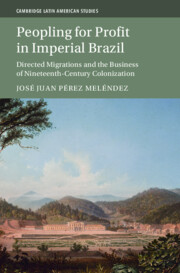 Peopling for Profit in Imperial Brazil
Peopling for Profit in Imperial Brazil Book contents
- Peopling for Profit in Imperial Brazil
- Cambridge Latin American Studies
- Peopling for Profit in Imperial Brazil
- Copyright page
- Dedication
- Contents
- Figures
- Tables
- Acknowledgments
- Note on Currency and Language
- Abbreviations
- Maps
- Introduction
- Part I Colonization’s Statecraft
- Part II Colonization Companies and the Colono Trade
- Part III Disentangling Companies and State
- 6 Cabinets and Companies
- 7 The Dregs of War
- 8 Coolies and Scandals
- Part IV Peopling the Country of the Future
- Conclusion
- Bibliography
- Index
- Series page
8 - Coolies and Scandals
Skullduggery, Bankruptcy, and the Coolie Question after the Free Womb Law
from Part III - Disentangling Companies and State
Published online by Cambridge University Press: 26 September 2024
- Peopling for Profit in Imperial Brazil
- Cambridge Latin American Studies
- Peopling for Profit in Imperial Brazil
- Copyright page
- Dedication
- Contents
- Figures
- Tables
- Acknowledgments
- Note on Currency and Language
- Abbreviations
- Maps
- Introduction
- Part I Colonization’s Statecraft
- Part II Colonization Companies and the Colono Trade
- Part III Disentangling Companies and State
- 6 Cabinets and Companies
- 7 The Dregs of War
- 8 Coolies and Scandals
- Part IV Peopling the Country of the Future
- Conclusion
- Bibliography
- Index
- Series page
Summary
With the end of the Paraguayan War, planters again panicked over impending labor scarcity. In response, prominent businessmen at the Court began to organize a new company to jumpstart a “coolie trade” to Brazil. Without a diplomatic entry-point into China, however, their efforts remained scattershot until they pressured the Brazilian government to pursue a commercial treaty with the Qing Empire. Meanwhile, Brazil’s top tycoon, the barão de Mauá, attempted to set up a model sugar central with Indian coolies from Mauritius in an effort to overcome a colossal bankruptcy. As British colonial subjects, these workers received special attention when they complained of poor treatment, which demonstrated the power of diplomatic representation to curtail planters’ disregard for contractual conditions and for workers in general. Both “experiments” were put to the test in the court of public opinion, where Sinophobia masked competing business interests. Whereas the Agricultural Congress of 1878 examined the potential of coolie labor to effect a labor “transition” with lukewarm enthusiasm at best, newspapers engaged in a battle of words with strong racist and eugenic undertones that, at base, had more to do with competition for readership and government contracts than the issue of Chinese colonization itself.
Keywords
- Type
- Chapter
- Information
- Peopling for Profit in Imperial BrazilDirected Migrations and the Business of Nineteenth-Century Colonization, pp. 259 - 290Publisher: Cambridge University PressPrint publication year: 2024
